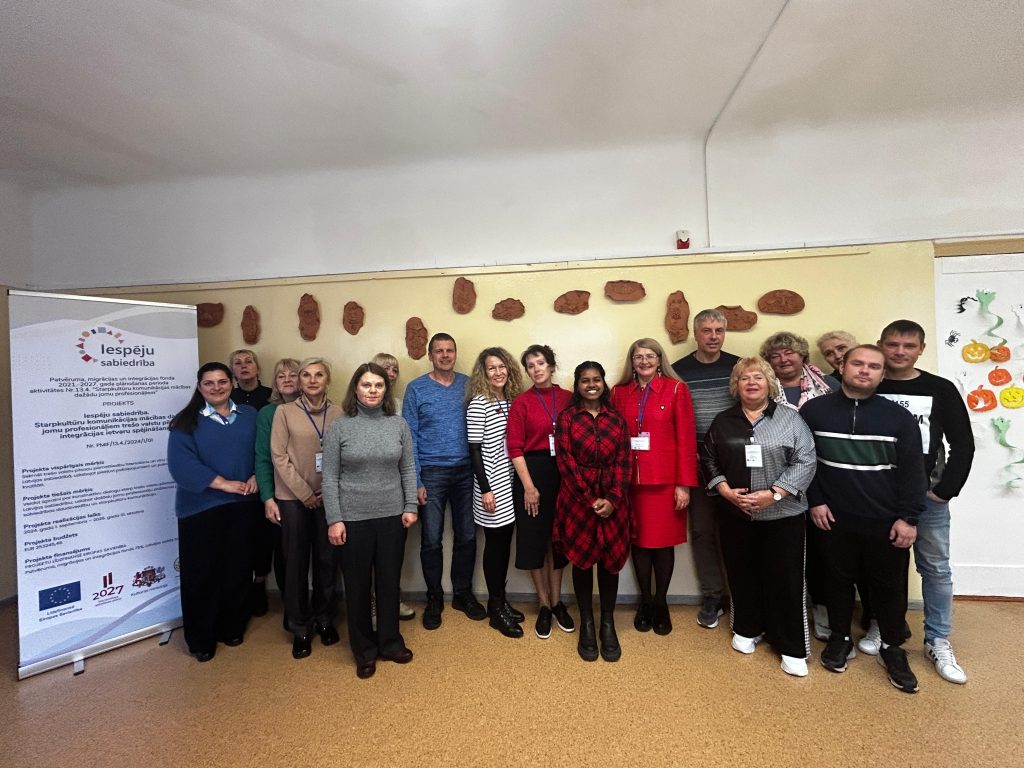
Professor Elīna Vasiļjeva from Daugavpils University and lecturer Dace de Senžermēna from the Latvian Academy of Culture focused on the ways intercultural communication is perceived and the differences across various cultures, skillfully combining theory with hands-on activities in an “innovation laboratory”. This was conducted through group work and interaction with third-country nationals. Meanwhile, docent Sandra Zariņa from Daugavpils University reinforced effective communication skills in a multicultural society through a variety of interactive exercises. The project participants enthusiastically engaged in the activities and highly appreciated the MeYou.One friendship cards.
Under the guidance of Professor Jānis Teivāns-Treinovskis from Daugavpils University and Oleksii Zarychanskyi, M.A. in Political Science, various aspects of international law and professional ethics were explored. These sessions included discussions on geopolitical and legal issues within an intercultural context.
The project’s educational leader, professor Maija Burima from Daugavpils University, addressed various issues related to the integration of third-country nationals. She invited Uttari Sathiyanka, a student from Sri Lanka studying at Daugavpils University, to share her experiences of adapting to life in Latvian and Daugavpils society, thus creating a structured discussion with the course participants. The audience asked Uttari as a third-country national many questions, which helped them “step into a stranger’s shoes” and gain a deeper understanding of the challenges associated with intercultural communication.
Docent Ingrīda Kupšāne from Daugavpils University used an interactive approach to demonstrate how to enhance the cultural competence of third-country nationals. The sessions incorporated excerpts from Latvian films, literary works, and theater performances, showcasing modern approaches to exploring Latvian culture.
Valuable insights were gained by course participants in sessions led by docent Igors Trofimovs from Daugavpils University related to hate speech. These sessions emphasized the legal aspects in relation to media literacy and the boundaries of communication.
Under the guidance of certified clinical and health psychologist Irēna Žukovska, the course participants were introduced to the key principles of discrimination and its prevention through a variety of methods, including “ice-breakers”, games and dialogue. They engaged in role-playing as both victims and perpetrators, analyzing situations and providing suggestions for discrimination prevention.
At the end of the training course, the target audience met again with professor Elīna Vasiļjeva from Daugavpils University, who invited them to explore theories on stereotypes and prejudices, as well as discuss their formation and prevention in different societal models. During the second topic, “Stereotypes and Prejudices”, Ukrainian citizen Valerii Kremenchutskiy, who has been living in Latvia since the start of Russia’s full-scale invasion of Ukraine in 2022, offered his perspective. The lecturer encouraged discussions about stereotypes associated with Ukrainians and Latvians, highlighting how various prejudices about both nations have changed since the start of the war. The course participants were impressed by Valerii’s excellent command of the Latvian language, which he had acquired in such a short time. Valerii’s example demonstrates successful integration into Latvian society; he works at Daugavpils University, is learning Chinese alongside Latvian, and actively participates in activities promoting integration.
The course was held from October 21, 2024, to October 25, 2024, as part of the Activity No. 13.4 “Intercultural Communication Training for Professionals from Various Fields” within the project “Opportunity Society: Intercultural Communication Training for Professionals from Various Fields to Strengthen the Integration Framework for Third-Country Nationals”, No. PMIF/13.4./2024/1/01, funded by the Asylum, Migration, and Integration Fund for the 2021–2027 planning period. The materials, coffee breaks, and lunch during the training were provided through the project budget.
This publication was created with the support of the Asylum, Migration, and Integration Fund.
The content of the publication is the responsibility of the Daugavpils University Association for Lifelong Learning, Culture, and Science Communication “Intellect Park”.
Project funding: PROJECT CO-FINANCED BY THE EUROPEAN UNION
Asylum, Migration, and Integration Fund 75%, Latvian State Budget 25%.
